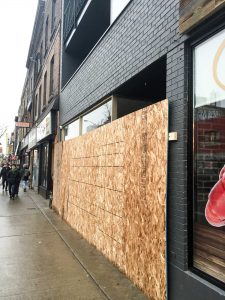Landlord shuts Pacifico Life storefront

PHOTO BY GEREMY BORDONARO/GLEANER NEWS: Pacifico Life’s Bloor Street West location remains boarded up. Landlord Yong Jo gave Tamara Hirsh three hours to move her marijuana dispensary out of the building shortly before Christmas.
By Geremy Bordonaro
It was 2 p.m. three days before Christmas when she got the telephone call.
Tamara Hirsh was working in the recently opened location of her medical marijuana dispensary when her landlord, Yong Jo, called and told her that the 444 Bloor St. W. storefront had to be vacated by 5 p.m. that afternoon.
It was not unexpected, but it was unwelcome.
“We knew that the landlords in Toronto were getting a letter saying that they were going to receive fines. And we told [the landlord] about that before we took possession and did our renovations,” said Hirsh, owner of Pacifico Life. “However he did not want to let us out of the lease at that point. So he responded to me with a long list of reasons why I wasn’t getting out of the lease. We proceeded to renovate and opened the store and sure enough he got a letter and asked us to close by 5 p.m. that day.”
“I had a lot of upset customers when we closed down”—Tamara Hirsh, owner, Pacifico Life
What Hirsh hadn’t expected were the police officers the landlord brought in for “peacekeeping” reasons.
“When the landlord came to me to make sure we were leaving, five police officers came as well,” she said, adding “they were very much on side with me. One was very much interested in the product for himself, one was interested in one of my dog treats. [The officers] were really supportive.”
Hirsh said the shutdown of her Toronto storefront means that some of her customers who had found their “tried and true” marijuana product would have to find some place else.
“I had a lot of upset customers when we closed down,” she said. “There were emails asking how they can find tested products like ours…. It let a lot of people down.”
Pacifico was one of a number of dispensaries that have been popping up at an increasing rate in the downtown area of Toronto. And the city is powerless to stop the influx, according to Joe Cressy (Ward 20, Trinity-Spadina).
“Cannabis is governed under the Controlled Drug and Substances Act, a federal statute. The City of Toronto cannot change federal law,” said the councillor. “The question of when the federal government changes the law and what framework they will put in for distribution, we don’t know for sure yet.”
Though dispensaries are still illegal, the move towards legalization has created inconsistencies when it comes to enforcing marijuana laws.
“We are stuck in a vacuum period where the federal government has said ‘Criminalization is bad but we’re going continue to have a criminalized approach until it is no longer the case,’” Cressy said. “In the meantime we’re all stuck in limbo.”
While this limbo exists it has been left to municipalities — and the dispensaries themselves — to help control the influx and quality of medical marijuana.
“It’s self-regulated. That’s why you’re getting everything under the sun,” Hirsh said. “You’re getting clustering in certain areas. Kensington Market, I believe, at one point had 21 dispensaries.”
The Toronto Police Service is called in to deal with them on a case-by-case basis according to Detective Sergeant Brian Kelly of 14 Division, who said investigations are primarily complaint driven.
Hirsh said she thinks some measures need to be taken in the interim.
“It’s going to probably take at least a year until federal legalization happens,” she said. “In the interim there needs to be some kind of regulation.”
The city is looking for ways to manage and contain the dispensaries, but without federal regulation it’s a wild frontier.
“The problem is that the federal government was elected in October of last year. That’s a year and a half ago. We were told that they would table legislation this spring,” Cressy said. “By the time that’s voted on and implemented we’re probably in 2018.”
“A comprehensive legalized framework is good news for public health. But in the meantime cities need the federal government to provide interim measures so we’re not stuck in a position whereby it’s akin to unregulated legalization.”
Hirsh added that it has created a grossly unfair situation where landlords can knowingly rent their spaces for large sums of money to dispensaries, and then evict their tenants after one telephone call from the police. At the end of the day, “There are a lot of people we could help if our doors were open.”
Landlord Yong Jo did not respond to the Gleaner’s requests for an interview.
SEE ALSO:
FOCUS (JANUARY 2017): Should marijuana dispensaries be closed? Bloor Street citizens have their say
READ MORE:
CHATTER: Marijuana dispensary opens (December 2016)
EDITORIAL: Mayo no, marijuana maybe (June 2016)
